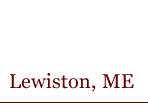






 |
 |
||||
 |
|||||
 |
|||||
 |
|||||
 |
|||||
 |
|||||
Students Prepare to "March for Women's Lives" in Washington, D.C.
Chemistry Professor Awarded $271,000 Grant
Retired Professor Passes Away
Debate Team Tackles Liberal Bias Issue
Students and Faculty Work to Use Less Energy
Catching Up With...Elizabeth Jackson
By Lou Dennig
Staff Writer
On Wednesday, April 7, four professors will host a forum titled “The
United States and Iraq: a forum for the Bates College community,” in
Skelton Lounge of Chase Hall. Forum leaders Professor James Richter, chair
of the Political Science Department, assistant Political Science Professors
Aslaug Asgeirsdottir and Matthew Nelson, and Phillips Professor of Religion
Tom Tracy.
Each of the four faculty members will deliver a short speech and then open
up the room to questions. “I think primarily we’re just interested
in hearing about what the campus community is thinking about this really important
issue, and this [forum] will allow them to articulate their concerns, their
aspirations and will structure the conversation so they can figure out the
core issues and focus on them,” said Nelson.
Asgeirsdottir’s speech will deal primarily with how intelligence was
handled, sovereignty, and how justified the United States is in going into
another nation and taking down its government. “I think what the recent
hearings in D.C. have shown us is that there really wasn’t much evidence
of WMD. In my mind there doesn’t seem to have been a lot of intelligence
on what the role of Saddam was on Iraqi life, and therefore we could not see
what his removal would do to Iraqi life,” said Asgeirsdottir. “It
seems to have been a relatively big intelligence failure and I want to discuss
the issue of why we didn’t have the knowledge when in hindsight we probably
should have.”
Nelson’s speech will concern how the Muslim world is reacting to the
events after September 11. “Muslims feel that despite the comments that
come from the White House and members of Congress that this is not a war against
Islam, I think that many people are really quite concerned that it may be
and I think they’re worried that the Bush administration isn’t
doing enough apart from occasional comments to suggest that in practice it’s
not,” said Nelson.
Asgiersdottir, not being a native of the United States sees part of her role
in this forum as providing insight to how Europeans view American foreign
policy since September 11. “There is a huge difference between what
the U.S. can and cannot do in the world and should and should not do. Before
the war started there was a prominent discussion about the divide between
the U.S. and Europeans on matters of foreign policy and that divide has not
gone away even though we don’t read about it anymore,” said Asgiersdottir.
This forum comes at a time when the majority of hostilities have concluded
while coalition deaths continue to rise. As of April 2, according to CNN,
there have been 704 coalition deaths and 3,457 U.S. troops have been wounded.
“Monitoring press coverage isn’t enough… what’s important
is taking a step back and looking at the implications as far as our academic
enterprises are concerned, and second looking at our own presumptions about
the way the world works, and seeing how this conflict changes those, and I
don’t think press coverage satisfies either of those at either of those
two levels and an institution like Bates is set up to satisfy precisely those
two levels,” said Nelson.
Respond to this article.